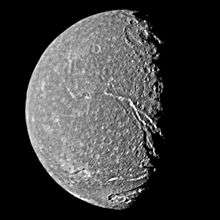Messina Chasma

The Voyager 2 image of Titania. Messina Chasma can be seen in the center.
Messina Chasma is the largest canyon on the surface of the Uranian moon Titania and is named after a location in William Shakespeare's comedy Much Ado About Nothing.[1] The 1492 km long chasma is made of two normal faults running NW–SE, which bound a down-dropped crustal block forming a structure called graben.[2] The canyon cuts impact craters, which probably means that it was formed at a relatively late stage of the moon's evolution,[3] when the interior of Titania expanded and its ice crust cracked as a result.[4] Messina Chasma has only a few crater superimposed on it, which also implies it is relatively young structure. The chasma was first imaged by the Voyager 2 spacecraft in January 1986.[2]
References
- ↑ USGS/IAU (October 1, 2006). "Messina Chasmata on Titania". Gazetteer of Planetary Nomenclature. USGS Astrogeology. Retrieved 2012-03-28.
- 1 2 Smith, B. A.; Soderblom, L. A.; Beebe, A.; Bliss, D.; Boyce, J. M.; Brahic, A.; Briggs, G. A.; Brown, R. H.; Collins, S. A. (4 July 1986). "Voyager 2 in the Uranian System: Imaging Science Results". Science. 233 (4759): 43–64. Bibcode:1986Sci...233...43S. doi:10.1126/science.233.4759.43. PMID 17812889.
- ↑ Plescia, J. B. (December 30, 1987). "Cratering history of the Uranian satellites: Umbriel, Titania and Oberon". Journal of Geophysical Research. 92 (A13): 14,918–14,932. Bibcode:1987JGR....9214918P. doi:10.1029/JA092iA13p14918. ISSN 0148-0227.
- ↑ Croft, S.K. (March 1989). New Geologic Maps of the Uranian Satellites Titania, Oberon, Umbriel and Miranda. Proceeding of Lunar and Planetary Sciences. 20. Lunar and Planetary Sciences Institute, Houston. p. 205C. Bibcode:1989LPI....20..205C.
This article is issued from Wikipedia - version of the 9/2/2015. The text is available under the Creative Commons Attribution/Share Alike but additional terms may apply for the media files.